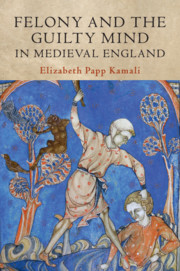Book contents
- Felony and the Guilty Mind in Medieval England
- Studies in Legal History
- Felony and the Guilty Mind in Medieval England
- Copyright page
- Dedication
- Contents
- Figures
- Acknowledgments
- A Note on the Text
- Abbreviations
- Introduction
- Part I Felonia Felonice Facta: Felony and Intentionality
- Part II Þe Deuylys Doghtyr of Hellë Fyre: Felony and Emotion
- 3 The Language of Anger
- 4 Cultural Understandings of Anger
- Part III Handlyng Synne: Guilt and Innocence
- Part IV Dies Iræ: Judge and Jury
- Conclusion
- Bibliography
- Index
4 - Cultural Understandings of Anger
from Part II - Þe Deuylys Doghtyr of Hellë Fyre: Felony and Emotion
Published online by Cambridge University Press: 18 July 2019
- Felony and the Guilty Mind in Medieval England
- Studies in Legal History
- Felony and the Guilty Mind in Medieval England
- Copyright page
- Dedication
- Contents
- Figures
- Acknowledgments
- A Note on the Text
- Abbreviations
- Introduction
- Part I Felonia Felonice Facta: Felony and Intentionality
- Part II Þe Deuylys Doghtyr of Hellë Fyre: Felony and Emotion
- 3 The Language of Anger
- 4 Cultural Understandings of Anger
- Part III Handlyng Synne: Guilt and Innocence
- Part IV Dies Iræ: Judge and Jury
- Conclusion
- Bibliography
- Index
Summary
Having encountered the manifold ways in which anger and related passions are employed in the plea rolls in Chapter 3, Chapter 4 then situates those legal texts within their broader cultural context, including the notion of the Last Judgement as the dies irae, or day of ire. Acknowledging that anger could be viewed in some contexts as a commendable emotion, the chapter then turns to the many reasons why confessors’ manuals and popular literary texts cautioned against cultivating anger in one’s personal life. For example, the chapter explains how anger was perceived to separate a person from his or her capacity to reason and how anger might escalate from thoughts to words to violent actions if allowed to develop into habit. The chapter then closes with some reflections on the nature of provocation in the medieval English felony context.
Keywords
- Type
- Chapter
- Information
- Felony and the Guilty Mind in Medieval England , pp. 123 - 162Publisher: Cambridge University PressPrint publication year: 2019

